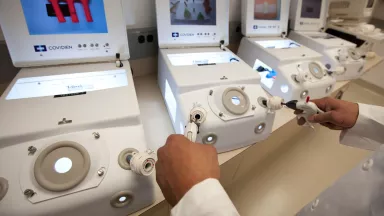Introduction
Our world-renowned orthopedic surgeons and orthopedists are experts in their fields with specialized training to provide the optimal diagnosis and treatment for a range of orthopedic conditions. We are internationally recognized for delivering the highest-quality orthopedic care to our patients.
What is frozen shoulder?
Frozen shoulder (adhesive capsulitis) is stiffness, pain and limited range of movement in your shoulder. It may happen after an injury or overuse, or it may happen from a disease, such as diabetes or a stroke. The tissues around the joint stiffen, scar tissue forms and shoulder movements become painful and hard to do. The condition usually comes on slowly and then goes away slowly over the course of a year or more.
What causes it?
Frozen shoulder can develop when you stop using the joint normally because of pain, injury, surgery or a chronic health condition, such as diabetes or a stroke. Any shoulder problem can lead to frozen shoulder if you do not work to keep full range of motion. Frozen shoulder occurs most often in:
- People 40 to 70 years old
- Women (especially postmenopausal women), as opposed to men
- People with chronic diseases
How is it diagnosed?
Your doctor may suspect frozen shoulder if a physical exam reveals limited shoulder movement. An X-ray may be done to see whether symptoms are from another condition, such as arthritis or a broken bone.
How is it treated?
Treatment for frozen shoulder usually starts with nonsteroidal anti-inflammatory drugs (NSAIDs) and application of heat to the affected area, followed by gentle stretching. Ice and medicines (including corticosteroid injections) may be used to reduce pain and swelling. Physical therapy can help increase your range of motion. A frozen shoulder can take a year or more to get better.
If treatment is not helping, two types of surgery are sometimes done to loosen some of the tight tissues around the shoulder. In one surgery, called manipulation under anesthesia, you are put to sleep and your arm is moved into positions that stretch the tight tissue. The other surgery uses an arthroscope to cut through tight tissues and scar tissue. These surgeries can both be done at the same time.
How can you prevent it?
Gentle and progressive range-of-motion exercises, stretching and using your shoulder more may help prevent frozen shoulder after surgery or injury. Experts don’t know what causes some cases of frozen shoulder, and it may not be possible to prevent these. Be patient and follow your doctor’s advice. Frozen shoulder nearly always gets better over time.
Physician Referrals
Montefiore Einstein embraces a collaborative approach.
If you have a patient who could benefit from our services, please reach out.
718-920-2060
Schedule a Visit
Have a general question or concern?
We’re available to help you by phone or email.
• 718-920-2060 • orthofeedback@montefiore.org






